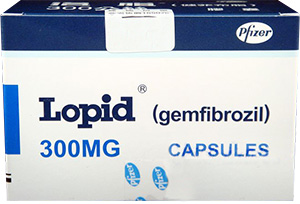
Active substance: Gemfibrozil
Dosage: 300 mg
Price: €57.58 – €352.41
If you have high cholesterol, you will most likely be prescribed a special diet and exercise to lose weight (if you need it). However, if your cholesterol is too high, in addition to the non-pharmacological treatments mentioned above, you will probably also be prescribed drugs to help lower bad cholesterol, because the body often does not respond to non-pharmacological treatments alone. One such drug is Lopid, which is well known in Germany and around the world. Below we explain the properties and effects of this drug. If you are already familiar with this remedy, now is the time to order a new bottle on our website. You will certainly be satisfied with your online purchase, because we offer incredibly favorable prices, fast delivery throughout Germany and the possibility to order the drug without a prescription.
Rosuvastatin 10 mg can help increase good cholesterol and reduce bad cholesterol.
What is Lopid
Lopid is a highly effective drug whose active ingredient is gemfibrozil, which has a lipid-lowering effect. Its relatively low toxicity, compared to other lipid-lowering drugs, is considered a great advantage.
Indications
It is prescribed as an adjunct to diet and other non-pharmacological therapies in the following cases: treatment of severe hypertriglyceridemia, mixed hyperlipidemia or primary hypercholesterolemia, when statins are contraindicated or not tolerated.
The drug is also indicated for the prevention of cardiovascular morbidity in men with elevated non-HDL cholesterol levels and high risk of a first cardiovascular event, when statins are contraindicated or not tolerated.
See Crestor price in Germany.
Contraindications for use
Like all drugs, Lopid has clearly defined indications for use. First of all, persons allergic to the active substance or to any of the ingredients should not take the product. It is also contraindicated in case of severe hepatic or renal insufficiency, gallbladder disease, gallstones, concomitant use of repaglinide or dazabuvir or simvastatin, as well as in people with a history of photoallergy or phototoxic reactions during treatment with fibrates. Do not take the drug during pregnancy and lactation.
Before starting treatment, contact your physician and inform him/her of all diseases and medications you are taking. This information will help your doctor to prescribe the correct treatment regimen and to avoid taking incompatible medications at the same time.
Side effects
At the start of treatment, some patients have reported dizziness, headache, dyspepsia, eczema, rash, general fatigue, slight decrease in hemoglobin, hematocrit and leukocytes. In most cases, these reactions disappear on their own and do not require medical intervention. However, if these reactions persist for a long time, medical attention should be sought.
Rarely, patients have experienced severe anemia, thrombocytopenia, leukopenia, eosinophilia, depression, decreased libido, atrial fibrillation, laryngeal edema, pancreatitis and appendicitis, cholestatic jaundice, hepatitis, cholelithiasis, cholecystitis, liver dysfunction, angiodystrophy, urticaria, dermatitis, alopecia, photosensitivity reaction, decreased hemoglobin, paresthesia.
If any of the above side effects occur, consult your physician immediately.
Use and posology
Tablets should be taken orally, 30 minutes before a meal with the necessary amount of water.
Consult your doctor before starting treatment. A dose different from the recommended dose may be necessary.
The recommended dose for adults is 1200 mg in two doses, 30 minutes before the morning and evening meals. A single dose of 900 mg half an hour before dinner is also recommended.
